Suchergebnisse
PlusIQ - Agricultural Photovoltaics: Integration as a Path to Plus-Energy-Quarters
This project examines opportunities, potentials and requirements of/for Agrophotovoltaic systems. Thereby, an interdisciplinary study will be conducted that integrates the major aspects of such systems holistically and from an integrative perspective. The complex interdependencies between the different aspects will be explored and described via a case study. Potential approaches toward realization will be studied and subjected to a comprehensive SWOT-analysis.
Urbaner Kältebedarf in Österreich 2030/2050
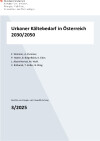
Systematische Aufarbeitung des steigenden Kühlbedarfs und Darstellung der geographischen Verortung des Kältebedarfs in Österreich. Das Ergebnis dient als Entscheidungshilfe bei der Entwicklung von Klimaschutzmaßnahmen und Klimawandelanpassungsstrategien sowie eine Abschätzung zum Kältebedarf der Zukunft.
Schriftenreihe
3/2025
F. Wimmer, A. Pummer, P. Holzer, B. Beigelböck, K. Eder, L. Abart-Heriszt, M. Wolf, C. Rzihacek, T. Keller, B. Kling
Herausgeber: BMK
Deutsch, 91 Seiten
Downloads zur Publikation
ReBuildStock - Portfolio-Management zur Dekarbonisierung großer Wohnungsbestände
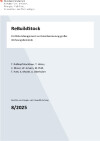
Portfolio-Managementmethode zur Unterstützung der Entscheidungsprozesse von Eigentümer:innen größerer Wohnungsbestände bei der Erarbeitung von Strategien zur schnellen und sozialverträglichen Dekarbonisierung ihrer Gebäudebestände.
Schriftenreihe
8/2025
T. Roßkopf-Nachbaur, T. Weiss, C. Moser, W. Amann, M. Ploß, T. Hatt, A. Mundt, A. Oberhuber
Herausgeber: BMK
Deutsch, 115 Seiten
Downloads zur Publikation
DW² - Entwicklung einer thermisch verbesserten Schlitzwandkonstruktion
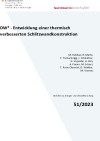
Die thermischen Eigenschaften von Schlitzwandkonstruktionen werden durch die Anwendung neuer Materialien und Herstellungsmethoden verbessert und durch Labor- und Feldversuche validiert sowie durch numerische und ökologische Betrachtungen ergänzt. Das Ergebnis kann bei der Errichtung von energetisch verbesserten unterirdischen Bauwerken wie beispielsweise Tiefgaragen oder zur Herstellung von Erdwärmespeichern verwendet werden.
Schriftenreihe
51/2023
M. Rebhan, R. Marte, F. Tschuchnigg, J. Schleicher, G. Vojvodic, H. Kim, A. Passer, M. Scherz, T. Potrc Obrecht, G. Winkler, M. Vremec
Herausgeber: BMK
Deutsch, 55 Seiten
Downloads zur Publikation
Urban district heating extended - Flexibilisierung und Dekarbonisierung urbaner Fernwärmesysteme
Entwicklung innovativer urbaner Fernwärmeversorgungssysteme durch Integration von Langzeitwärmespeicher, (Groß-)Wärmepumpe, solarthermische Großanlage, Abwärme und simulationstechnischer Analyse und Bewertung. Das Ergebnis dient als Vorbild für Technologieauswahl und Einsatzreihenfolge neuer urbaner Fernwärmeversorgungsgebiete.
Urban district heating extended – Development of flexible and decarbonized urban district heating systems
Development of innovative urban district heating systems by integration of long-term thermal storage, large scale heat pumps, large scale solar thermal installations, waste heat recovery and analysis and evaluation by simulation. The results of this project will provide templates for technology selection, system design and merit order for new urban district heating areas.
Innovationsachse Graz-Gleisdorf (G2G)
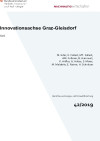
Entwicklung von Test- und Demonstrationsgebieten im Rahmen von ausgewählten Stadt(teil)entwicklungsvorhaben entlang der Innovationsachse Graz-Gleisdorf mit Fokus auf die Bereiche Energie, integrierte Gebäudetechnologien, smarter Stadtraum, kompakte Siedlungsstruktur, Nutzungsmix - Stadt der kurzen Wege, Generationenwohnen, intermodale Mobilität sowie Informations- und Kommunikationstechnologien (IKT).
Schriftenreihe
42/2019
M. Eder, K. Fallast, MT. Fallast, AM. Fulterer, B. Hammerl, K. Höfler, G. Huber, S. Maier, M. Malderle, E. Rainer, H. Schnitzer
Herausgeber: BMVIT
Deutsch, 115 Seiten
Downloads zur Publikation
ENUMIS - Energetische Auswirkungen von Urban Manufacturing in der Stadt
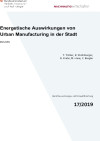
Das Projekt beleuchtet die Herausforderungen von Urban Manufacturing (UM) aus Energiesicht und zeigt Chancen auf, die sich durch eine Umsetzung von UM-Konzepten in Hinblick auf die Konzeption nachhaltiger Energiesysteme für Städte ergeben.
Schriftenreihe
17/2019
T. Tötzer, R. Stollnberger, R. Krebs, M. Haas, C. Biegler
Deutsch, 44 Seiten
Downloads zur Publikation
Abwasserreinigung zur hybriden Energiespeicherung, Energiebereitstellung und Wertstoffgewinnung (AR-HES-B)
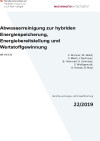
AR-HES-B verfolgt das übergeordnete Ziel, technologische Änderungen der kommunalen Abwasserreinigung zu entwickeln, um die Abwasserreinigung vom Energieverbraucher hin zum hybriden Energieerzeuger und Energiespeicher und als Wertstoffbereitsteller zu erreichen. Durch das AR-HES-B Konzept positioniert sich die städtische Abwasseraufbereitung als eine wichtige Drehscheibe im überregionalen Energie- und Stoffaustausch.
Schriftenreihe
22/2019
C. Brunner, W. Glatzl, S. Meitz, J. Buchmair, B. Hammerl, H. Schnitzer, S. Wohlgemuth, O. Nowak, B. Mayr
Herausgeber: BMVIT
Deutsch, 28 Seiten
Downloads zur Publikation
Häuser für Energie und RessOurcenEffiziente Siedlungen (HEROES)
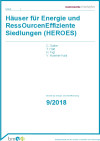
Ein vereinfachtes Verfahren für die Berechnung von ökologischen Kennzahlen für bisher nicht betrachtete Gebäudeteile (thermisch nicht relevante Bauteile und Haustechnikkomponenten) wird entwickelt. Die methodischen Grundlagen für die Berechnung der Primärenergie und der CO2-Emissionen im Betrieb und in den verbauten Materialien werden harmonisiert.
Schriftenreihe
9/2018
C. Sutter, T. Hatt, H. Figl, V. Huemer-Kals
Herausgeber: BMVIT
Deutsch, 79 Seiten
Downloads zur Publikation
KELVIN - Reduktion städtischer Wärmeinseln durch Verbesserung der Abstrahleigenschaften von Gebäuden und Quartieren
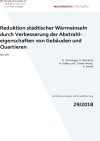
Potentialabschätzung einer möglichen Abschwächung des Auftretens städtischer Wärmeinseln durch die Veränderung der Oberflächenalbedo unterschiedlicher Stadtstrukturen (Boden, Dachflächen, Dachbegrünung etc.) bzw. damit verbundener Energieeinsparung durch Reduktion des Kühlungsbedarfs und Emissionsreduktion, um positive Auswirkungen auf Gesundheit und Lebensqualität (Human- und Wohnkomfort) in Städten zu ermöglichen.
Schriftenreihe
29/2018
H. Schwaiger, D. Neil Bird, H. Gallaun, M. Zuvela-Aloise, K. Andre
Herausgeber: BMVIT
Deutsch, 97 Seiten
Downloads zur Publikation
Repair & Do-It-Yourself Urbanism (R&DIY-U)
Das Projekt verfolgte die Zielsetzung, das transformative Potential des Repair & DIY-Urbanism zu stärken. Dies erfolgte im Hinblick auf eine grundlegende Umwandlung des vorhandenen wenig nachhaltigen Umgangs mit Gebrauchsgütern in konkreten Stadtbezirken, deren Infrastrukturen und dominante Wirtschafts- und Alltagspraktiken hin zu resilienten Stadtbezirken.
Repair & Do-It-Yourself Urbanism (R&DIY-U)
The project follows the aim to analyze and to strengthen the transformative potential of Repair & Do-It-Yourself Urbanism with regard to a fundamental change of the existing poor sustainable handling of commodities in selected urban districts, their infrastructures and dominant business and private household practices into resilient areas.
Energieeffizienz-Potenzial intelligenter Kernverdichtung des urbanen Raums (EPIKUR)
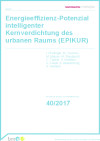
Das gegenständliche Forschungsvorhaben befasste sich mit den Möglichkeiten, Implikationen und Rückkopplungen, die sich durch eine "Stadterweiterung nach innen" mittels innerstädtischer urbaner Verdichtung ergeben. Dabei wurde Nachverdichtung als paradigmenfrei untersucht, d.h. unabhängig von bestehenden Regulativen, sondern anhand des vernünftig machbaren.
Schriftenreihe
40/2017
Herausgeber: BMVIT
Deutsch, 111 Seiten
Downloads zur Publikation
G2G – Innovation axis Graz-Gleisdorf
Development of testbeds and demonstration zones within already designated areas for urban development along the Graz-Gleisdorf Innovation-Axis with a focus on energy, integrated building technology, smart city-spaces, compact settlement structures, generational living, and ‘cities of short ways’. It will pay specific attention to intermodal mobility as well as ICT-based solutions.
KLIMUR – Klimaresilientes urbanes Ressourcenmanagement am Fallbeispiel Zukunftshof und Rothneusiedl
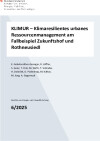
Für das Konzept des Zukunftshofs, einer innovativen urbanen Landwirtschaft, sollen durch Optimierungstools und parametrischem Design Entwicklungsszenarien für ein integriertes Energie- und Ressourcenkreislaufsystem entwickelt werden. Eine Roadmap, bestehend aus technischen Konzepten und einer abgestimmten Finanzierungsstrategie, soll die Grundlagen für ein Demoprojekt liefern, das in der Praxis zeigt, wie der Zukunftshof Ausgangspunkt und Basis für eine ressourceneffiziente und klimaresiliente Stadtentwicklung sein kann.
Schriftenreihe
6/2025
E. Gebetsroither-Geringer, R. Löffler, S. Geier, T. Fink, M. Wirth, T. Vobruba, H. Dolinšek, D. Podmirseg, M. Kaftan, M. Jung, A. Gugumuck
Herausgeber: BMK
Deutsch, 46 Seiten
Downloads zur Publikation
Parametrische Planung für ein Nachhaltiges Nutzdach (Blau, Grau und Grün) – NaNu3
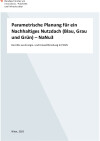
Aufzeigen der Machbarkeit und Validierung eines Parametrischen Modelles, das in einem frühen Planungsstadium die kombinierte Nutzung von Dachflächen auf ihre praktische und finanzielle Umsetzbarkeit und Mikroklima- und Umweltwirksamkeit überprüfen kann.
Schriftenreihe
47/2025
Martin Jung, Theresa Fink, Paul Kinner, Karl Berger, Shokufeh Zamini, Marcus Rennhofer, Paul Erian, Antonija Wieser, Susanne Formanek, Isabelle Haymerle, Franz Dolezal, Philipp Boogman, Petra Gruber
Herausgeber: BMIMI
Deutsch, 47 Seiten
Downloads zur Publikation
E_PROFIL - Quartiersprofile für optimierte energietechnische Transformationsprozesse
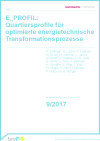
Mit E_PROFIL, als Methodenset zur Erstellung von Quartiersprofilen, wird ein wichtiger EDV-gestützter Werkzeugkasten geschaffen, der in der Planungspraxis österreichischer Städte zur Anwendung kommen wird, um eine energie- und ressourceneffiziente Stadtentwicklung zu unterstützen. Er ist ein wertvolles Asset für die Forschungs- und Planungsaktivitäten in Siedlungsverbänden.
Schriftenreihe
9/2017
R. Giffinger, D. Latzer, R. Kalasek, M. Ecker, M. Getzner, et al.
Deutsch, 211 Seiten
Downloads zur Publikation
Stadtquartiere mit optimierten solar-hybriden Heiz- und Kühlsystemen (CiQuSo)
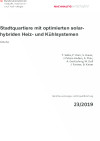
Das Forschungsansuchen untersucht, evaluiert und optimiert effiziente Systemlösungen zur solaren Energieversorgung auf Gebäude- und Stadtquartiersebene. Die Anwendbarkeit der entwickelten Konzepte wird am Beispiel des Salzburger Stadtquartiers Itzling demonstriert.
Schriftenreihe
23/2019
T. Selke, P. Horn, S. Hauer, J. Peters-Anders, A. Thür, A. Goritschnig, W. Doll J. Furtner, B. Kaiser
Herausgeber: BMVIT
Deutsch, 81 Seiten
Downloads zur Publikation
Potenzial der ökologischen Optimierung technischer Gebäudeausrüstung durch den Einsatz biogener Materialien (BiBi-TGA)
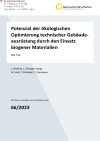
Erhebung des Substitutionspotenzials herkömmlicher Komponenten der technischen Gebäudeausrüstung durch biogene Materialien. Ziel war die Generierung neuer Daten zum ökologischen Verbesserungspotenzial des Einsatzes biogener Ressourcen in der technischen Gebäudeausrüstung in Bürogebäuden. Anhand von LCA-Screenings und Untersuchungen der technischen Umsetzbarkeit wurden die Potenziale analysiert.
Schriftenreihe
66/2023
J. Weithas, L. Eitzinger-Lange, M. Leeb, T.Schnabel, F. Coosmann
Herausgeber: BMK
Deutsch, 60 Seiten
